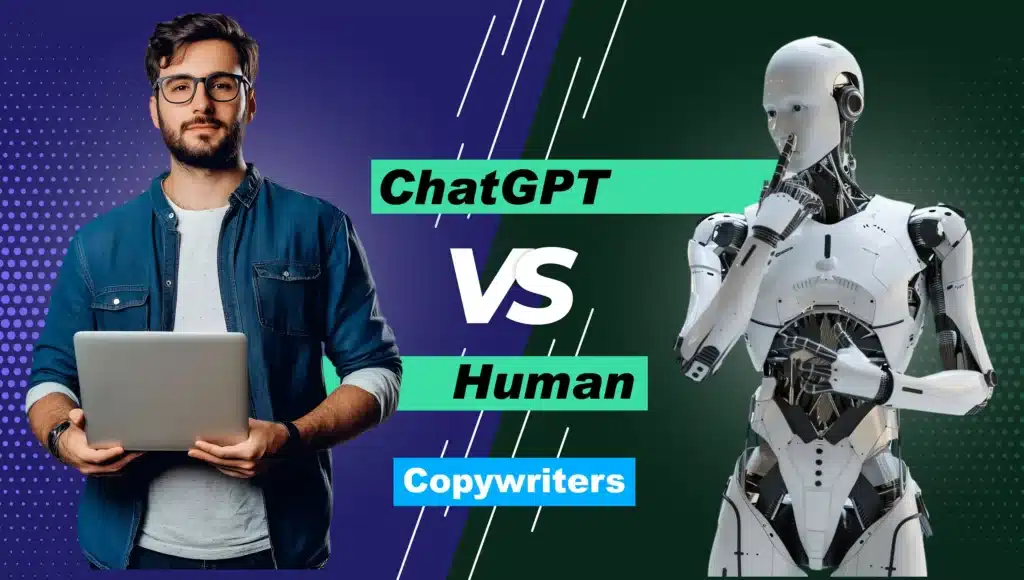Is AI Copywriting a Threat or a Tool?
In an era where content is currency, the rise of AI tools like ChatGPT has sparked a heated debate: Can artificial intelligence outperform human copywriters? With businesses seeking scalable, fast, and cost-effective content solutions, many are asking whether AI is a viable alternative or even a replacement.
Spoiler alert: It’s not a binary decision.
This post explores 5 common myths about ChatGPT and copywriting, separating hype from facts to help marketers, entrepreneurs, and creatives make informed decisions. Whether you’re creating landing pages, product descriptions, or SEO blog content, understanding the strengths and limitations of both ChatGPT and human writers is essential for driving brand growth.
Current Trends: AI and Human Writers in the Content Economy
The global AI copywriting market is projected to surpass $1.3 billion by 2030 1, with over 82% of marketers now integrating AI tools like ChatGPT into their content workflows 2. However, contrary to doomsday headlines, the demand for skilled human copywriters hasn’t vanished.
According to HubSpot, 61% of marketers say that while AI improves efficiency, human editing is still essential for tone, nuance, and persuasion 3.
The hybrid model is rising, where human creativity is enhanced, not replaced, by AI.
The 5 Biggest Myths About ChatGPT vs. Human Copywriters
Myth 1: ChatGPT Writes Better Than Humans
AI can generate high-volume content quickly. But does “better” mean faster or more effective?
- What ChatGPT excels at:
Grammar, structure, factual recall, formatting, SEO-friendly content. - Where humans outperform:
Emotional resonance, narrative depth, voice consistency,and cultural nuance.
📌 Bottom Line:
ChatGPT is a tool, not a creative visionary. It can write well, but not brilliantly—unless a human shapes the output.
Myth 2: AI Is Always Cheaper and Faster
AI tools seem like a budget-friendly choice—until hidden costs emerge.
- Time spent prompting, editing, and optimizing
- Risk of duplicate content penalties or brand misalignment
- Potential compliance or copyright issues
Example: A poorly reviewed AI-generated campaign led to a PR backlash for a global brand in 2023, costing them far more in reputation damage than they saved in copywriting fees.
📌 Bottom Line:
AI reduces upfront cost but introduces backend challenges. Human copywriters are still more cost-effective for premium, high-impact content.
Myth 3: ChatGPT Understands Brand Voice
ChatGPT can mimic tone, but it doesn’t understand your brand’s story or values.
- No AI can internalize your brand DNA, tone strategy, or audience psychology without extensive training.
- Human copywriters bring contextual intelligence—the ability to adapt tone based on platform, audience, and intent.
📌 Bottom Line:
ChatGPT can assist with voice alignment, but humans still define voice.
Myth 4: AI Will Replace All Copywriters
Automation is evolving—but so are the jobs it touches.
According to McKinsey, AI will augment, not eliminate, most creative roles. Copywriters will become content strategists, editors, prompt engineers, and brand voice specialists.
New roles emerging:
- AI Copy Editors
- Prompt Architects
- Voice Consultants
- Human-AI Brand Teams
📌 Bottom Line:
AI is a creative multiplier, not a job killer. Writers who adapt will lead.
Myth 5: AI Content Always Ranks Better for SEO
Google’s Helpful Content Update in 2023 reinforced this: originality, depth, and human value matter most.
AI content can support your SEO strategy by:
- Structuring long-form content
- Generating content ideas
- Enhancing on-page optimization
But to rank, content must:
- Deliver real value
- Be trustworthy and authored
- Include expertise-backed insights
📌 Bottom Line:
ChatGPT can build the foundation, but ranking requires human-added value.
Actionable Framework: When to Use ChatGPT vs. Human Copywriters
Use this decision matrix to balance efficiency with quality:
| Task Type | ChatGPT Ideal? | Human Writer Ideal? |
| SEO Blog Drafting | ✅ | ✅ (for editing/EEAT) |
| Product Descriptions | ✅ | ✅ (for brand voice) |
| Sales Copy / Landing Pages | ❌ | ✅ |
| Email Campaigns | ✅ (ideation) | ✅ (tone/strategy) |
| Thought Leadership | ❌ | ✅ |
| Social Media Content | ✅ | ✅ (for trends/humor) |
Pro Tip:
At Zellyo Digital, we use ChatGPT to accelerate production and human editors to ensure brand coherence, persuasion, and SEO depth.
Case Study: Zellyo Digital’s Hybrid Content Model
In 2024, Zellyo Digital scaled a client’s content production by 240% without sacrificing quality. How?
- Used ChatGPT to generate blog skeletons and idea drafts.
- Human writers then layered in brand tone, original insights, and calls-to-action.
- Final content passed SEO QA checks, including meta optimization, EEAT signals, and Google NLP compliance.
Results:
- 4x increase in organic traffic
- 38% higher time on page
- 61% lower bounce rate
✅ Hybrid model = scalability + quality
Expert Insights: What the Pros Say
“ChatGPT is a game-changer—but without human oversight, it’s just a content generator, not a storyteller.”
— Ann Handley, Chief Content Officer, MarketingProfs
“AI accelerates content ops. But remember: GPT doesn’t know your audience. You do.”
— Neil Patel, SEO Expert
“Google rewards content that demonstrates experience. That’s not something you can prompt.”
— Marie Haynes, Google Algorithm Specialist
FAQs About ChatGPT and Copywriting
- Can ChatGPT fully replace a copywriter?
No. It can support content creation, but strategic messaging, brand tone, and persuasion require human input. - Is ChatGPT good for SEO content?
Yes, especially for structuring posts and suggesting keywords. But human review is needed to meet EEAT standards. - How do agencies use ChatGPT today?
Most use it to ideate, draft outlines, or optimize copy. Very few publish AI-only content without human editing. - Can ChatGPT write emotionally engaging content?
It can approximate emotional tone but often lacks depth. Human storytelling remains superior. - Is AI-generated content legal to use?
Yes, but you must ensure originality, avoid plagiarism, and verify factual accuracy. Attribution and disclaimers may be necessary. - Should businesses still hire copywriters in 2025?
Absolutely. Copywriters are evolving into strategic content architects who leverage AI tools, not compete with them.
Conclusion: Humans + AI = The Future of Copywriting
Let’s be clear: this isn’t a battle between ChatGPT and human copywriters. It’s a collaboration.
The future belongs to teams and brands that:
- Use AI for scale and speed
- Use human creativity for nuance and trust
- Focus on audience-first, value-rich, emotionally intelligent storytelling
At Zellyo Digital, we champion the hybrid model, where content is powered by AI and perfected by humans.
Need a copy that converts and scales?
👉 Talk to Zellyo’s content team and discover our AI-enhanced copywriting service.


